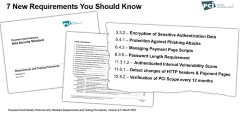
Our Cash Discount Program eliminates nearly all fees for online and subscription businesses. In this guide, we’ll break down everything you need to know about Payway’s Cash Discount Program: what it is, how it works and how to set it up!
Download PDFPayment Processing
Recurring Payment Processing
Recurring Payment Features

By preparing for PCI DSS version 4, businesses not only ensure compliance with industry standards but also enhance overall security, reduce risks, and build trust with customers and partners.
Learn More
Our Cash Discount Program eliminates nearly all fees for online and subscription businesses. In this guide, we’ll break down everything you need to know about Payway’s Cash Discount Program: what it is, how it works and how to set it up!
Download PDF
By preparing for PCI DSS version 4, businesses not only ensure compliance with industry standards but also enhance overall security, reduce risks, and build trust with customers and partners.
Learn More
Our Cash Discount Program eliminates nearly all fees for online and subscription businesses. In this guide, we’ll break down everything you need to know about Payway’s Cash Discount Program: what it is, how it works and how to set it up!
Download PDF
By preparing for PCI DSS version 4, businesses not only ensure compliance with industry standards but also enhance overall security, reduce risks, and build trust with customers and partners.
Learn More
Our Cash Discount Program eliminates nearly all fees for online and subscription businesses. In this guide, we’ll break down everything you need to know about Payway’s Cash Discount Program: what it is, how it works and how to set it up!
Download PDF
By preparing for PCI DSS version 4, businesses not only ensure compliance with industry standards but also enhance overall security, reduce risks, and build trust with customers and partners.
Learn More
Our Cash Discount Program eliminates nearly all fees for online and subscription businesses. In this guide, we’ll break down everything you need to know about Payway’s Cash Discount Program: what it is, how it works and how to set it up!
Download PDF
By preparing for PCI DSS version 4, businesses not only ensure compliance with industry standards but also enhance overall security, reduce risks, and build trust with customers and partners.
Learn MoreHistorically, interchange fees have been imposed on businesses to reimburse issuing banks for lost interest resulting from a cardholder’s grace period for repaying their debt. This is why Visa still refers to interchange fees as “interchange reimbursement fees.” Visa considers it as a transfer fee between acquiring banks and issuing banks for each Visa card transaction. Visa uses these fees to balance and grow the payment system for the benefit of all participants. This fee, however, is a fee that is ultimately passed on to the merchant to pay.
Interchange fees account for the bulk of your business’s credit card processing expense, making it very important to ensure that the majority of transactions qualify to the lowest possible categories as often as possible. If a lot of your transactions are from commercial credit cards, Level 3 processing will lower your Visa interchange fee by passing through additional data to the processor.
Below are some of the most common Visa interchange fees as of April 2021 from CreditDonkey. There are dozens of interchange fees (many of which aren’t listed here). The rates vary based on card type, transaction method, and type of business. Go here to see a complete list of Visa interchange fees.
| Visa Debit Card | Swipe Rate (card present) |
| Visa Debit (small bank) | 0.8% + 15¢ |
| Visa Debit (big bank/regulated) | 0.05% + 22¢ |
| Visa Debit Prepaid | 1.15% + 15¢ |
| Visa Debit Card | Keyed Rate (card not present) |
| Visa Debit (small bank) | 1.65% + 15¢ |
| Visa Debit (big bank/regulated) | 0.05% + 22¢ |
| Visa Debit Prepaid | 1.75% + 20¢ |
| Visa Credit Card | Swipe Rate (card present) |
| Visa Credit Basic | 1.51% + 10¢ |
| Visa Rewards Traditional | 1.65% + 10¢ |
| Visa Rewards Signature | 2.30% + 10¢ |
| Visa Rewards Signature Preferred | 2.1% + 10¢ |
| Visa Business | 2.20% + 10¢ |
| Visa Corporate | 2.50% + 10¢ |
| Visa Credit Card | Keyed Rate (card not present) |
| Visa Credit Basic | 1.80% + 10¢ |
| Visa Rewards Traditional | 1.95% + 10¢ |
| Visa Rewards Signature | 2.70% + 10¢ |
| Visa Rewards Signature Preferred | 2.40% + 10¢ |
| Visa Business | 2.25% + 20¢ |
| Visa Corporate | 2.70% + 10¢ |
| Visa International | Interchange Rates |
| Visa International | 1.10% |
| Visa International Premium | 1.80% |
| Visa International Corporate | 2.00% |
| Visa International Keyed | 1.60% |
*The credit card networks typically update their interchange fees two times a year, in April and in October.
Every post in your inbox
